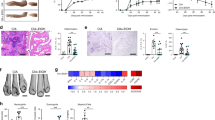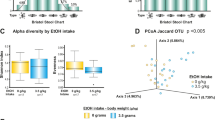Abstract
Alcohol consumption is associated with increased morbidity and mortality related to infectious diseases and malignancy1–5, although immune mediation of these relationships is controversial. Specifically, the activity of natural killer (NK) cells, which are involved in the resistance to infections and metastasis, can be suppressed in the presence of ethanol in vitro. However, acute consumption or infusion of ethanol in vivo exerts no effects on NK activity assessed in vitro thereafter. Therefore, we have developed and used a method to study the effects of ethanol on NK activity in living rats by using an NK–sensitive metastatic process and selective depletion of NK cells in vivo. Acute ethanol intoxication caused a marked suppression of NK activity in vivo and a tenfold increase in the number of MADB106 tumor metastases. Ethanol had no effect in rats selectively depleted of NK cells or when an NK–insensitive tumor (C4047) was used. These findings suggest that even acute ethanol intoxication markedly suppresses NK activity in the living organism. This suppression may underlie some aspects of the association between alcoholism, infectious disease and malignancies.
This is a preview of subscription content, access via your institution
Access options
Subscribe to this journal
Receive 12 print issues and online access
$209.00 per year
only $17.42 per issue
Buy this article
- Purchase on Springer Link
- Instant access to full article PDF
Prices may be subject to local taxes which are calculated during checkout
Similar content being viewed by others
References
MacGregor, R.R. Alcohol and immune defense. JAMA 256, 1474–1479 (1986).
Jerrells, T.R., Saad, A.J. & Domiati-Saad, R. Effects of ethanol on parameters of cellular immunity and host defense mechanisms to infectious agents. Alcohol 9, 459–463 (1992).
Watson, R.R.,, R. R. Ethanol, immunomodulation and cancer. Prog. Food Nutr. Sci. 12, 189–209 (1988).
Roselle, G., Mendenhall, C.L. & Grossman, C.J. Effects of alcohol on immunity and cancer. in Alcohol, Immunity, and Cancer, (eds. Yirmiya, R. & Taylor, A.N.) 3–21 (CRC Press, Boca Raton, Florida, 1993).
Watson, R.R. et al. Alcohol, immunomodulation, and disease. Alcohol Alcohol 29, 131–139 (1994).
Garro, A.J. & Lieber, C.S. Alcohol and cancer. Annu. Rev. Pharmacol. Toxicol. 30, 219–249 (1990).
Yirmiya, R., Ben-Eliyahu, S. & Taylor, A.N. Alcohol and cancer: Biochemical and immunological mechanisms. in Alcohol, Immunity, and Cancer, (eds. Yirmiya, R. & Taylor, A.N.) 257–286 (CRC Press, Boca Raton, Florida, 1993).
Yirmiya, M.R. Alcoholism and reduced natural killer cell activity: Role of central CRF in neural control of immunity. Adv. Biosci. 86, 69–78 (1993).
Blank, S.E., Pfister, L.J., Gallucci, R.M. & Meadows, G.G. Ethanol-induced changes in peripheral blood and splenic natural killer cells. Alcohol. Clin. Exp. Res. 17, 561–565 (1993).
Welsh, R.M. et al. Demonstration of antiviral role of natural killer cells in vivo with a natural killer cell-specific monoclonal antibody (NK1.1). Nat. Immun. Cell Growth Regul 9, 112–120 (1990).
Oldham, R.K. Natural killer cells: History, relevance, and clinical applications. Nat. Immun. Cell Growth Regul 9, 297–312 (1990).
Lotzova, E. Definition and functions of natural killer cells. Nat. Immun. 12, 169–176 (1993).
Mather, G.G., Talcott, P.A. & Exon, J.H. Characterization of a chemically induced tumor model and the effects of natural killer cell depletion by antiasialo GM-1. Immunobiology 190, 333–345 (1994).
Ben-Eliyahu, S. & Page, G.G. In vivo assessment of natural killer cell activity in rats. Prog. Neuro. Endocrin. Immunol 5, 199–214 (1992).
Barlozzari, T., Leonhardt, J., Wiltrout, R.H., Herberman, R.B. & Reynolds, C.W. Direct evidence for the role of LGL in the inhibition of experimental tumor metastases. J. Immunol 134, 2783–2789 (1985)
Barlozzari, T., Reynolds, C.W. & Herberman, R.B. In vivo role of natural killer cells: Involvement of large granular lymphocytes in the clearance of tumor cells in anti-asialo GM1-treated rats. J. Immunol 131, 1024–1207 (1983).
Gorelik, E., Wiltrout, R.H., Okumura, K., Habu, S. & Herberman, R.B. Role of NK cells in the control of metastatic spread and growth of tumor cells in mice. Int. J. Cancer 30, 107–112 (1982).
Hanna, N. The role of natural killer cells in the control of tumor growth and metastases. Biochim. Biophys. Acta 780, 213–226 (1985).
Schantz, S.P., Brown, B.W., Lira, E., Taylor, D.L. & Beddingfield, N. Evidence for the role of natural immunity in the control of metastatic spread of head and neck cancer. Cancer Immunol Immunother. 25, 141–148 (1987).
Wiltrout, R.H. et al. Role of organ-associated NK cells in decreased formation of experimental metastases in lung and liver. J. Immunol 134, 4267–4274 (1985).
Leslie, I. & Gordis, E. Alcohol and immunology GoProgress and questions. Alcohol Clin. Exp. Res. 17, 725–726 (1993).
Meadows, G.G. & Blank, S.E. Modulation of natural killer cell activity by alcohol. in Alcohol, Immunity, and Cancer (eds Yirmiya, R. & Taylor, A. N.) 55–86 (CRC, Boca Raton, Florida, 1993).
Ochshorn-Adelson, M. et al. Effects of ethanol on human natural killer cell activity: In vitro and acute, low-dose in vivo studies. Alcohol Clin. Exp. Res. 18, 1361–1367 (1994).
Yirmiya, R., Ben-Eliyahu, S., Gale, R.P., Liebeskind, J.C. & Taylor, A.N. Ethanol increases tumor progression in rats: Possible involvement of natural killer cells. Brain Behav. Immun. 6, 74–86 (1992).
Nakachi, K. & Imai, K. Environmental and psychological influences on human natural killer cell activity in relation to good health practices. Jpn. J. Cancer Res. 83, 798–805 (1992).
Wu, W.J., Wolcott, M.R. & Pruett, S.B. Ethanol decreases the number and activity of splenic natural killer cells in a mouse model for binge drinking. J. PET 271, 722–729 (1994).
Long, G.S., Hiserodt, J.C., Harnaha, J.B. & Cramer, D.V. Lymphokine-activated killer cell purging of leukemia cells from bone marrow prior to syngeneic transplantation. Transplantation 46, 433–438 (1988).
Levy, S., Herberman, R., Lippman, M. & d'Angelo, T. Correlation of stress factors with sustained depression of natural killer cell activity and predicted prognosis in patients with breast cancer. J. Clin. Oncol 5, 348–353 (1987).
Henderson, I.C. & Canellos, G.P. Cancer of the breast. N. Engl J. Med. 302, 17–30 (1980).
Chambers, W.H., Vujanovic, N.L. & Hiserodt, J.C. Monoclonal antibody to a triggering structure expressed on rat natural killer cells and adherent lymphokine-activated killer cells. J. Exp. Med. 169, 1373–1389 (1989).
van den Brink, M.R.M., Hunt, L.E. & Hiserodt, J.C. In vivo treatment with monoclonal antibody 3.2.3 selectively eliminates natural killer cells in rats. J. Exp. Med. 171, 197–210 (1990).
Page, G.G., Ben-Eliyahu, S. & Liebeskind, J.C. The role of LGL/NK cells in surgery-induced promotion of metastasis and its attenuation by morphine. Brain Behav. Immun. 8, 241-249 (1994).
Page, G.G., Ben-Eliyahu, S., Yirmiya, R. & Liebeskind, J.C. Morphine attenuates surgery-induced enhancement of metastatic colonization in rats. Pain 54, 21–28 (1993).
Chambers, W.H. et al. Functional heterogeneity between NKR-Plbright/Lycopersicon esculentum lectin (L.E.)bright and NKR-Plbright/L.E.dim subpopula-tions of rat natural killer cells. J. Immunol 148, 3658–3665 (1992).
Yeager, M.P. & Colacchio, T.A. Effect of morphine on growth of metastatic colon cancer in vivo. Arch. Surg. 12, 454–456 (1991).
Author information
Authors and Affiliations
Rights and permissions
About this article
Cite this article
Ben-Eliyahu, S., Page, G., Yirmiya, R. et al. Acute alcohol intoxication suppresses natural killer cell activity and promotes tumor metastasis. Nat Med 2, 457–460 (1996). https://doi.org/10.1038/nm0496-457
Received:
Accepted:
Issue Date:
DOI: https://doi.org/10.1038/nm0496-457
This article is cited by
-
Significantly enhanced lung metastasis and reduced organ NK cell functions in diet-induced obese rats
BMC Obesity (2017)
-
Exploiting the critical perioperative period to improve long-term cancer outcomes
Nature Reviews Clinical Oncology (2015)
-
The marginating-pulmonary immune compartment in mice exhibits increased NK cytotoxicity and unique cellular characteristics
Immunologic Research (2014)
-
De novo lung cancer diagnosed 32 months after liver transplantation: Report of a case
Surgery Today (2011)
-
An improved model to study tumor cell autonomous metastasis programs using MTLn3 cells and the Rag2−/− γc−/− mouse
Clinical & Experimental Metastasis (2009)



